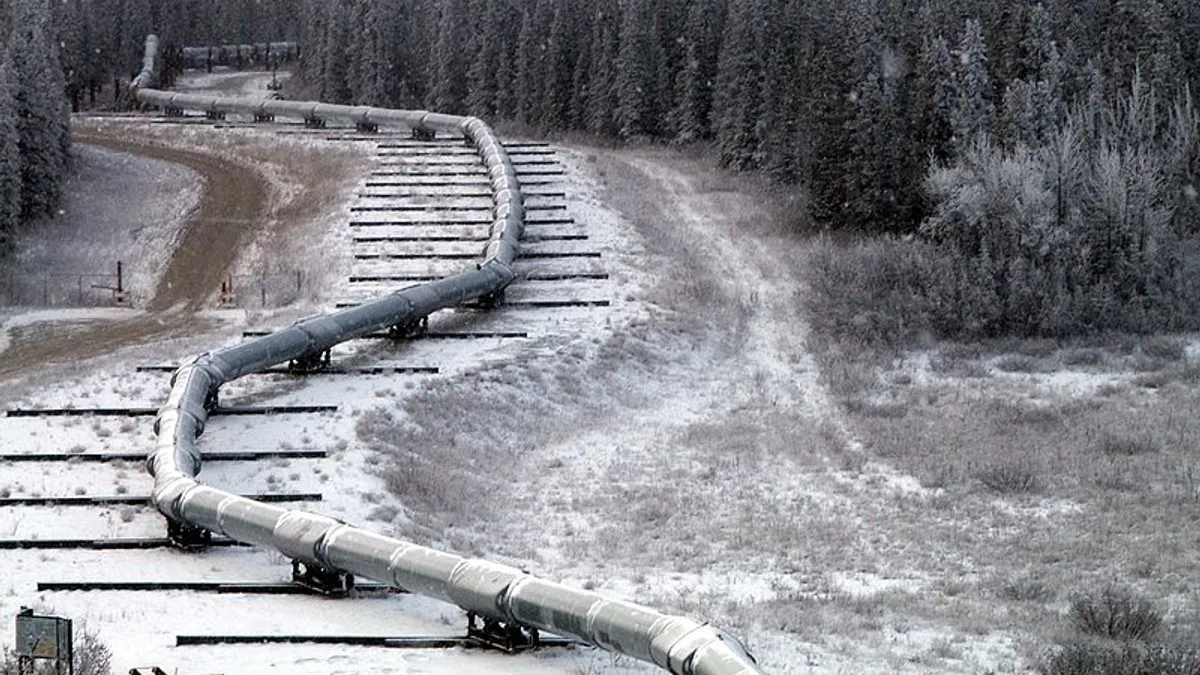Dive Brief:
- Electricity utilities in Maine should not charge their customers for expansions of natural gas pipeline infrastructure, a study from the staff of the Maine Public Utilities Commission concluded. The report is a recommendation to regulators, who are expected to rule on the matter this summer.
- The study stems from a 2013 law that allowed the PUC to authorize electric utilities to rate base investments in natural gas transportation infrastructure. An earlier staff report from 2014 cautioned regulators that pipeline investments would not be cost effective for customers "unless the cost of pipeline capacity is very low.”
- Large electric customers criticised the staff report, saying other state and regional assessments in the Northeast support the expansion of pipeline capacity. Environmental groups welcomed the recommendations, saying Maine utilities should be focusing on alternatives to fossil fuel generation.
Dive Insight:
In 2013, Maine lawmakers passed the Energy Cost Reduction Act, aimed at avoiding electric rate increases based on natural gas after the state was hit with a series of price spikes in previous years.
The law authorized regulators to allow annual fees on electric ratepayers of up to $75 million a year to expand natural gas pipeline capacity — if regulators found the investment to be cost effective.
In 2014, a preliminary staff assessment told commissioners to proceed with caution, saying that the benefits to consumers of authorizing annual fees up to $75 million are "unlikely ... [to] exceed the costs of pipeline capacity."
The new staff report builds on those concerns, saying that other factors like persisting low gas prices and planned expansion of other pipelines could temper any winter price increases.
“The record in this proceeding does not support a finding that [a pipeline contract] is reasonably likely to provide net benefits for Maine electricity and natural gas consumers under a sufficiently broad spectrum of future scenarios," the staff concluded. "Moreover, regional market conditions, rule changes and other events suggest that the price and volatility concerns that led to the [2013 law] may be addressed without [a contract].”
The proceeding took on new importance, the Portland Press Herald notes, after Kinder Morgan shelved plans for a $5 billion pipeline expansion in April that would have delivered shale gas to the Northeast. It was one of three companies bidding to provide pipeline capacity to Maine, though the other two proposals remain under consideration.
Industrial electric customers in the state panned the staff report, saying it is an outlier in the region.
“It’s extremely disappointing that the PUC staff hired a consultant which produced the only report out of 30 that found no value in additional pipeline capacity,” Tony Buxton, a lawyer for the Industrial Energy Consumer Group, told the Press Herald. The state public advocate also criticised the study, saying Maine should join with other Northeast states in purchasing capacity.
The Conservation Law Foundation, however, said it "commends the report conclusion that an unprecedented and highly risky contract for natural gas pipeline capacity paid for by Maine consumers is not in the public interest."
While the report was written by PUC staff, it is a recommendation to commissioners, and not a final decision. The staff, the Bangor Daily News pointed out, said regulators should keep an open mind to future proposals, even if current pipeline capacity expansion is not cost-effective.
“The benefits of being the ‘first mover’ in the region in terms of committing to [long-term natural gas capacity contracts] are not obvious,” the report states. “Indeed, it is likely to be more beneficial to decide whether to act … when there is greater clarity about the effects of market actions as well as activity in other states.”
Regulators are expected to rule on authorization for the gas pipeline investments in late June or early July.













